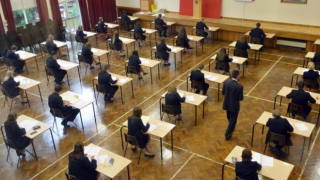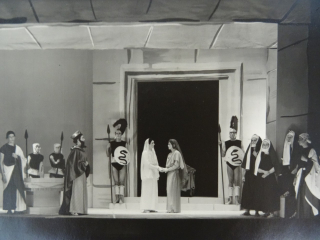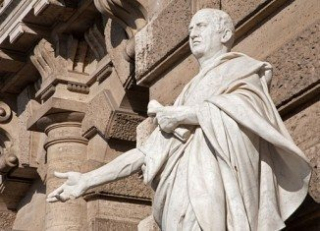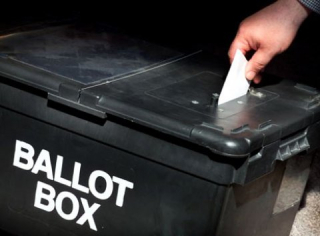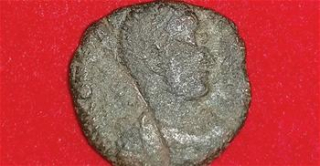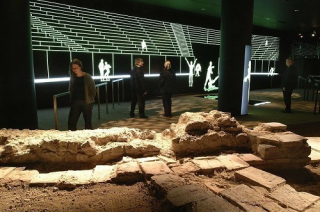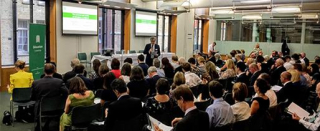Mary Beard's Blog, page 9
October 18, 2016
The bigger issues behind scrapping A levels
I am as anxious as the next person that as many kids as possible (and not just the posh ones) should get a chance to study at school the subjects that AQA examining board has announced it is scrapping, including Art History, Classical Civilization and Archaeology (all, I think, with a small or very small enrollment). Neither Art History nor Archaeology are offered by other boards, so that is "Scrapping" with a capital S. Classical Civilization is also offered by OCR, so there is less cause for concern on that (I have never been much of a fan of "competition" in exam syllabuses, but I agree that all your eggs in one basket may not be a great idea).
But quite a lot of the handwringing seems to me to miss some bigger points. And interestingly, there has been virtually none for most of the other subjects being scrapped, that are not so close to the heart of the chattering classes. I am not sure that I myself shed a tear for the demise of Citizenship Studies A level, or Science in Society, and I dont know enough about them to comment (but I am sure they have their supporters, and maybe those without the hotline to newspaper desks).
And what are those bigger issues? Well first, one of the reasons given by AQA in the case of Art History and Archaeology has much wider implications: it boiled down to not being able to find the examiners. Waldemar Januszczak missed the point I think when he tried to squash that one by writing (subscription only):
"There are enough experienced art historians living within a couple of miles of me in north London to mark the nation���s art history papers 10 times over!"
Marking school exams requires additional skills beyond expert knowledge; ther fact that you can curate a Leonardo exhibition doesn't mean you can assess the nation's young -- and I wonder how many would want to do it anyway. It's a relatively low paid and relatively thankless task. The benefit for most teachers who take it on is that they get an inside view of the system they are preparing their pupils for.
But, that apart, this is surely weasel words from AQA. Part of the problem of our current assessment system is that it really doesnt have enough markers across the board to deal expertly with the millions and millions of scripts that are written each year. Art History is only the tip of an iceberg, and ought (if the AQA claims are anything like true) have been a wake up call to look at the relationship between expertise and the burden of examining more generally.
There are however even bigger question about the "fit" between what we teach, what young people learn and what we test them on.
One of the developments of the last thirty years or so is that with a few exceptions (like sex education) we assume that the whole of the school curriculum will be examined; if there is no exam on it, then it is not taught (and I can confidentally predict a compulsory test on sex, personal relations and consent before too long). Maybe we should be prepared to think of a school curriculum that contained fewer examinable subjects, and more that was taught that wasnt tested by national exams?
And may be we should look at the definition of some of these examinable subjects. How about a history syllabus that included special options in art history or archaeology? Maybe too we should think harder about the relationship of school subjects and university subjects. Back in the day (sorry to sound old and nostalgic) there would have been no possibility that universities would be looking for Art History A level from those wanting to read Art History (because there wasnt an Art History A level -- it's a relatively new invention). Even now, no one imagines that potential doctors or lawyers will have done Human Biology (another AQA casualty) or "Law". In fact medical courses are keener on Physics etc. Why do we invest so much in the beaten track from A level to degree.
The important issue here is how we let as many children as possible experience and get enthused by a range of subjects, examined or not. Blaming AQA for what, I am prepared to admit may have been a short-sighted decision, just reveal how enthralled we have all become to that link between between teaching and public testing.
That is what we should be challenging.
October 16, 2016
Antigone in 1939
Today I took a small part in a symposium in Cambridge, held to coincide with the triennial Cambridge Greek Play (this year a double bill of Lysistrata and Antigone). I am sure that I have confessed before to a bit of an ambivalence about ancient Greek plays performed in Greek: I am fascinated by the phenomenon in an intellectual kind of way (and I wish them every success), but I really dont enjoy actually watching them. And the truth is I haven't actually seen a Cambridge play since the Medea in 1974. This year I had a cast iron excuse as I was away all week, but I suspect that I would have chickened out even if I had been around.
Anyway, I was down to speak briefly on a panel on "Politics and Revolution", and I decided to look a bit more carefully at the first time Cambridge tried Antigone -- in 1939, almost exactly six months before was was declared.
It may be a bit of an exaggeration, but I almost came to the conclusion that if Oxford had its "King and Country" moment in 1933, the Cambridge (on similar themes) had its "Antigone" moment. It was almost certainly the first time that the "Greel Play" in Cambridge was ever politicised.
There was no doubt that this was a production that had modern dicators in mind (you can find a plot summary among the links here). Some newly composed Greek verses were printed in the programme to the effect that "modern Creons" had better watch out. And almost ever review picked that theme up. As the Telegraph reviewer put it, "There are Creon���s everywhere today too numerous to mention, and most of them too obvious to miss."
In truth, not quite all reviewers picked this out. Surprisingly perhaps Louis MacNeice (who reviewed it for the Spectator) alluded only briefly to the fact that "Creon is always with us", and was more concerned with the play's use of "old" Greek pronunciation, and (odd this) with the ���far too feminine��� features of the man who played Creon. But most of them did, while remaining rather vague about which modern Creons they had in mind. The only candidate actually mentioned was not one of the most obvious; it was Metaxas of Greece. And those allusions were partly prompted by the fact that the Greek ambassador came to see it one night. As a comment piece in the Guardian had it: ���I can imagine no more apt dispatch from his excellency to Athens than one that advised General Metaxas to re-read his Antigone.���
I find myself partly agreeing with Simon Goldhill, who also spoke at the symposium: that there is something unsatisfying about the usual (slightly self-congratulatory) view that this play parades the conflicts with dictatorship (did we need Antigone to tell us that oppression was bad?).
But amongst all these good political pieties, my eye was caught by the name of that "feminine featured" Creon (whom, to be fair, most reviewers liked a lot). It was Ronald Millar, who later in life became Mrs Thatcher's speech writer, and penned "the Lady's not for burning" speech. (He is also one of the main characters in my friend Peter Stothard's new book, The Senecans, which actually touches on this performance.)
There was a thought a very satisfying irony in contemplating the real-life future of the boy who played Creon, not as dictator but as loyal courtier to a very iron lady.
October 13, 2016
What to ask when you get that TV offer!
Let me say, to start with, that I am no expert in the ways of TV production and commissioning. But people, especially fellow academics (young and old), often ask me for tips they should have when they get rung up or emailed by TV companies, looking for a presenter or expert contributor (the contributor bit will come in a later post). Let's say we are talking documentaries, and that you are mildly interested in TV. If you are not, I am assuming you will end the conversation pretty quickly and need no tips at all.
So here are some assorted thoughts, based on a few years experience and participant observation.
To crudify a bit, you pick up the phone and it's a person from an independent production company called Whizz TV (I've invented that, so apologies if there is a real company of that name), who says that they are pitching a three-part series on Sex in Ancient Rome to Channel 5 and they would like you to be the presenter.
So hang on. Assuming that this is something you know about (and dont touch it with a barge poll if you don't), find out first if the person you are talking to knows anything about Roman sex, beyond perhaps Tiberius in his swimming pool, and who exactly they are in the company (a producer/editor or someone junior who's been given the job of ringing round). The most important thing, whatever their rank, is whether they have done any work on the subject and whether you can talk to them sensibly: it may be ok to give the job to a junior, but not to one who knows nothing, or hasnt taken the trouble to find out. And dont write anything down for them till you have got further.
MY rule with TV is that I talk for free, but I only write for a fee (they'll use it anyway, whether they hire you or not).
If they pass that test, then you need to discover what this company has done before (ask them and google them), and how they came across you (have they actually read anything you have written, why do they think you will be good at the job?). Don't worry that they are an 'independent company". Most documentaries are made that way now, but what is the profile of the channel they intend to pitch to (Channel 5 is different from BBC 4) and have they actually made any approaches and worked with that channel before. If not, you are probably, though not necessarily, a dupe.
Suppose you are still interested. Then ask to speak to the development producer, the "exec" or editor of this potential series. This s the point where you need to really find out if your views knit with theirs. I don't mean necessarily agree (some of the most fun times I have had with television people has been arguing and disagreeing) but if you have strong views they need to come outnow. At my own first venture into TV I said I would no way do a documentary with B grade actors dressed up in togas, saying "Pass the grapes Marcus". And I'm really glad I said that.
But this is also the time to ask who might direct this series. They wont yet know, but if they are serious they should have some people in mind (so look up what they have done).
And if this has all gone OK, it is the time to get an agent. It is, I believe, entirely possible to negotiate a book contract on your own, and I usually do (I have no UK agent, though confess am very well looked after by Inkwell in the US). But a TV contract is incomprehensible to ordinary mortals, so you wont know what you are signing away or what to ask for.
But I think at this point it is good to remember two things. First, there is no big money to be made for most of us here. Forget all those stories about mega-rich BBC presenters. Those are not us (and I dont think there are as many of them as we are led to believe). You might, if you are lucky, get a new bathroom out of a TV series, but you wont get a new house (as a friend who had done it put it to me). True, even that is a perk that many would understandably envy, but at an hourly rate you will have worked hard for it. Much more important, if you are looking at the financial benefit, is to stick with the day job, get promoted and get the pension (even now). TV won't pay the mortgage, and the day job will be there when TV has gone; so nurture it.
Second, it is only worth doing if it is fun (as well as dull at times -- there is an awful lot of waiting around), if it fits with your own research interests and if you get on well with those you are making the programmes with. To put that another way, it has to be a shared, collaborative, intellectually worthwhile project. Happily that has worked for me. Some of my best and most interesting friends in recent years have come through Lion TV, a great indie company who has made most of "my" programmes (and I mean "our") programmes for the BBC. I have been lucky -- but there is lots of fun for more to share, provided you keep your unstarry eyes open.
October 9, 2016
What is a demagogue?
When I was taking Ancient History A Level, back in 1972, what went wrong with the history of Athens in the fifth century BC (and what led to the defeat of Athensin the Peloponnesian War) was fairly straightforward. A new class of politicians arose. Gone were the wise counsels of the likes of Pericles. Instead there was a new breed of demagogues, such as Kleon and Kleophon. The men stirred up the people with false promises, manipulating the basest of popular instincts by a showy rhetoric, and so ensuring that the popular assembly voted for superficially attractive proposals that in the medium term proved disastrous.
Much the same, we learnt, went on in Rome in the first century BC. On the one hand, you had the sensible Cicero (even if it was hard not to think him rather pompous). On the other, there was the disreputable Clodius, speaking weasel words to the people, bribing them with free handouts, all in the pursuit of personal power.
It was only when I got to university that I was taught that there might be another side to this. The basic reason that we think that Pericles is such a model is that we have come to see the period so heavily through the eyes of Thucydides -- who had no doubt that Pericles was just what Athens needed (Thucydides' political sympathies were moderate oligarchy, and he had no qualms about supporting a leader whose career could be seen as about as close to elected dictatorship you could get under a radical democracy). There was another side to this. For a start, the attacks of the new breed of politicians were partly snobbish. It may have been satire for Aristophanes to brand them "sausage-sellers" and the like. But it seems fairly clear that they were of "newer money" than the blue-blooded Pericles. And besides, the closer you looked at Pericles' relationship with (and manipulation of) the Athenian people, the less difference there seemed between him and Kleon. "Was Pericles a demagogue?" was a standard essay topic. The answer usually a guarded yes.
And you could do a similar reconstruction job on Clodius if you started to peel away the Ciceronian prejudice (and Cicero, directly or indirectly, is almost our only source). From one point of view, Clodius may have been bribing the people with free handouts. From another, you could see free grain as an effective form of poor relief, advocated by a politician who actually noticed to needs of those less well off than himself.
The word "demagogue" ("leader of the people") was, in short, a dangerous term of political analysis, a slur usually in the ancient world thrown at a powerful speaker with whom you disagreed. Or, in one of Ambrose Bierce's subversive definitions, "demagogue n, a political opponent".
But there is more to it than that. If, in relation to the ancient world, accepting accusations of demagoguery is lazy history, in the modern world it is dangerously lazy politics. I am getting increasing fed up with the word being thrown at Trump or Farage or whoever, as if that was enough, that was all that needed to be said. Once you have agreed they are "demagogues", you don't have to carefully unpick their arguments, you can just take it for granted they are wrong (as "demagogues" by definition are).
Now, by the time you read this, the Trump campaign may have imploded. But if it hasnt, I hope his opponents will concentrate more on his substance than on his style. For what is truly alarming is that there is substance there -- and it is that whose faults, illogicalities and misprisions need to be starkly exposed.
(I had further, and other, thoughts in this area in an article in the Cheltenham Literary Festival souvenir number of the TLS, a special free issue available at the festival...do pick one up if you are there.)
October 4, 2016
Democracy: beyond the ballot box
I am getting more and more fed up with the assumption, increasingly bandied around, that democracy comes down simply to popular voting. I know I have been here before, but allow me to have one more go, then hold my peace. I'm not just talking about the Brexit referendum, but about a whole range of other things, from how the Labour shadow cabinet should be chosen to how we should judge our political success, after we have intervened in what were once pretty nasty dictatorships (ballot box, ballot box, ballot box is always what we are shown... grateful Iraqis putting their cross in the box). Sure, as my philosopher chums would say, voting may be a necessary condition for democracy, but it sure isn't a sufficient one. "The people have spoken" is never quite the simple claim it may seem.
For a start, different electoral rules and systems can produce very different results that we more or less accept. In our system (and in most represenative democracies) governments can be elected without securing a majority of the popular vote. We tend to accept that as a price to be paid for (among other things) the direct relationship between individual groups of the electorate and their chosen representatives. Referenda too have quite different checks and balances written in. In the recent vote in Hungary on curbing migration, a higher proportion of the total population of the country voted for curbs than voted for Brexit here, but in Hungary it did not pass because they had a turn-out quorum which it didn't meet (unlike the UK... even though our turn out would have met the Hungarian requirements). Other systems try to get over that problem by insisting on a super-majority to ensure a real mandate, not 50% but 60% or 70%, But ironically the Hungarian referendum would easily have met that requirement. The bottom line is that it is very hard to work out how to evaluate the power of those who bother to vote versus the power of the people as a whole. And again, interestingly, in Hungary those opposed to the proposal actually manipulated the quorum effect by not turning up at the polling stations.
Then again there is the Australian solution, which compels people to vote (even if they want to exercise their democratic right not to... spoiling the ballot paper becoming the only option).
And that is only the beginning. Another question is who exactly are the people who have the vote. If it seems obvious that those under 18 should not have a "democratic" say, it is worth remembering that a 100 years ago it would have seemed equally obvious to many that women should not have the vote either. (And quite why prisoners should be deprived of their "democratic" vote I have never quite understood.) And more than that, there is the issue of under what conditions they vote. We would all recognise that a "democratic" dictatorship which rounded up the people at gun point and watched over them as they put their cross in the right place was no "democracy" at all. But how do we judge electoral decisions made when the voters have no access to information on the basis of which they can make a responsible decision. It's not quite a gun point scenario, but in terms of a free and fair election it's on the same spectrum (shared knowledge is one of the most important underpinning of radical democracy).
Initiave too, as I broached before, is another crux. Do we think we have a democracy if the role of the electorate is simply (as we are currently seeing in the US presidential elections) to choose passively between a couple of millionaires? Should we not also be looking for ways political policy is formed, and the structures that allow an active role in the political process across the social spectrum? (And I don't mean by that, rich guys like Nigel Farage and Donald Trump dressing themselves up as men of the people...)
Next time we hear that "people have spoken" phrase, lets remember that indeed they may have, but also that they may not have ... and that real democracy certainly needs a ballot box, but is a lot more complicated, difficult and interesting than that.
October 1, 2016
Did the Romans get to Japan?
It has been a big couple of weeks for the extensive reach and multiculturalism of the Roman empire. First, there were the putative people of putative Chinese ancestry (I'm putting that carefully) found in Roman London. Now there has been another much hyped discovery, of Roman coins, probably Constantinian (early fourth century AD) , found in a medieval castle in Japan.
To be fair, this has been treated in the media with considerably more circumspection than the Chinese connection. And that is partly because very few of us, me included, really understand the history of this castle where these coins (which I guess are Constantinian, but well....who really knows?) were found. Even the journalists have trod carefully.
For me -- and all I have done is look at the media reports, like everyone else -- is that the "facts" dont quite add up. From what we read, the place was abandoned by the sixteenth century. Yet along with the Roman coins, there were Ottoman coins of the seventeenth century. This doesnt look to me like a "sealed deposit"! And it rings warning bells about collectors and collections. Like, for example, should we be imagining an eighteenth-century Japanese coin collector just dropping a little bag of his collecton into the castle's ruins?
It reminds me of a "light bulb" moment when I was an undergraduate, thanks to Moses Finley. I am sure he wrote about this somewhere, but I haven't found it. What I remember is that he was explaining to us one academic line which stressed how many fragments of Greek pottery had been discovered in some Scandanavian country (I am afraid I can't recall which). The raw figures of the fragments made it look like (as some really did argue) that there was quite a classical Greek presence here up north, or among our Scandanavian neighbours.
As Finley pointed out to us, this was all fine ... except that all these many fragments came from one single pot, presumably a prize possession of a modern collector, which in its eventual dispersion, when broken up, was found in a variety of different locations.
Message: you can't simply take pottery as a proxy for where the ancient Greeks or Romans actually were.
September 28, 2016
Clinton vs Trump
I feel very ambivalent about presidential debates. They are gripping spectacle, and they do prompt further debates off-screen. But, as I've said before, the idea that people might make up their minds on whom to vote for on the basis of this choreographed stand-off, for which the candidates have been prepping for weeks (even if they claim they have only taken the previous Friday off for a bit of last minute mugging up). To put this another way, when it comes to choosing a President or a Prime Minister, their ability to "win" (whatever victory means in this context) in a debate of this sort is pretty low down on the list of what I am looking for.
Anyway, ambivalent or not, I was curious enough about how it would turn out to have the telly on in bed in the early hours of Tuesday morning to watch/listen in a semi-conscious sort of way. (The husband was awake for every minute and claims that I was occasionally in the land of nod, but when I reheard the highlights the next day, I did remember pretty much all of them.)
So who did I think won?
Well, in a way obviously, Clinton -- although the prepared soundbites stuck out glaringly. I dont think that: "As soon as he travels to 112 countries and negotiates a peace deal, a cease-fire, a release of dissidents, an opening of new opportunities and nations around the world . . . he can talk to me about stamina" came spontaneously; nor the line about "I prepared to be president". (Cicero, when he wrote about the most effective oratory, was very down on learned-up jokes and quips: candidates take note.) But you can't get over the fact that Trump appeared to talk for outsiders to the "system" (though quite how much someone who is able to borrow $14 million from their Dad can count as an "outsider" to any system I dont know).
And you can't get over the fact that the slick debate format makes it very hard to confront simple and repeated untruths with the far more complicated truths. But usefully CNN did a pretty thorough fact check soon after and showed that Clinton repeatedly (not always, but repeatedly) getting the facts right, and Trump repeatedly (not always, but repeatedly) making seriously false claims, at a level that went far beyond a slight economy with the verit��. It is well worth reading.
If democracy is worth anything, it has to be worth taking not just truth but also complexity seriously.
September 24, 2016
Did Chinese live in Roman London?
One of the latest discoveries from Roman London has just hit the news. "Chinese lived in Roman London" is the message (or "How did two Chinese skeletons find their way into a Roman Cemetery in London?" to quote the Daily Mail). Professional archaeologists have been a lot more cautious. But what is the truth about the two Chinese skeletons in ancient London ?
Well, it is absolutely obvious that Rome and Roman Britain were much more multi-cultural/multi-ethnic societies than has often been assumed. You can see exactly that in some of the epitaphs that survive (my favourite is put up to his wife near Hadrian's Wall by "Barates from Palmyra"). But there is increasing evidence from skeletal remains of a very wide diaspora ending up in Roman Britain. You find a sub-saharan ancestry for the so-called "Bangle lady" in York and "Beachy Head Woman" from East Dean; and that ancestry is largely judged from the shape of the skull. But recent science has gone a bit further.
New science can examine the teeth of ancient skeletons, and can work out something about the environment in which the person grew up while their adult teeth were forming in the jaw. It is still a bit rough and ready, but it is already possible to say, for example, that the dead person spent their early years in a climate much warmer than the one in which they died.
So where does it leave these "Chinese" in Roman London?
Well, we have two skeletons whose skull formation suggests a far eastern ancestry. That is based simply on the shape of the skull, and it is a reasonaable but not fail-safe diagnostic. Their teeth composition strongly suggests that they had grown up somewhere warmer than Britain. None of this means that they came directly from China. There were all kinds of trading connections between Rome and China: that is where Roman silk came from, and Chinese sources seem to have called Rome "greater China". But the connections were as much indirect as direct. And the likely story is that if the skull morphology is correct (big "if") then these people were the grandchildren or great grandchildren of someone with some connection by marriage to China some way back, and part of a diaspora over generations.
That is to say, in other words , they attest to the multicultural world of the Roman empire. But they do not mean that these are a pair of people who made their way, in one generation, from China to Rome.
If you want a clear and expert description on the science and its limitations, then try what Kristina Killgrove has to say here.
September 22, 2016
America's Rome
I have just been giving some talks and lectures in America, starting in Houston and ending up in Los Angeles vis Seattle. One of the places I visited was Scripps College (above), which is I guess the Newnham of Los Angeles, a women's college on the West Coast, so a kind of home from home. But there were other great locations too: Los Angeles Public Library, Seattle Town Hall and Christ Church Cathedral in Houston. Thanks to all for the great welcome. I am now in need of a good night's sleep!
I was, of course, talking about things Roman (as usual), but there was a difference from what I have found before. People at lectures have always been quite keen to raise questions about parallels between ancient Rome and modern America. But -- on the basis of this four-day visit (and it wasn't a representative sample, I agree) -- that has ramped up a notch. Everywhere I went, I had questions about how far we could draw parallels with, or learn lessons from, ancient Rome.
What is it that has driven this interest? In part, it seems to be Trump. As I've said before, there is something about Trump which brings out the Roman in people. But if I prefer to see the only real comparison in the Julius Caesar style hair, there have been all kinds of suggestions which make Trump the late Republican demagogue (Clodius?), or even the new Caesar in a much more fundamental sense (the classic populist dictator, the restorer of order after the debacle of the late Republic -- albeit at the cost of autocracy, and so on). In part, it was an issue of imperial geo-politics. Is the American empire (if that's what you should call it) experiencing a decline like that of the Roman empire? And what caused the decline of the Roman empire anyway?
A bit of both, of course. But I think it is driven by a much greater institutional echo between ancient Rome and modern America than anything we know in the UK. In Britain we connect with Rome largely through historical geography (roads, place names, and the Roman villa in our backyards); they were here. In the USA, it is much more a question of the (constructed) inheritance of political institutions: the senate, the Capitol, etc. So, at the cost of a bit of wild generalisation, political issues and debates can very quickly and apparently "naturally" get a Roman dimension. I mean, we don't here compare Farage to a Roman -- but that seems to be a favourite point of reference in the States.
It certainly produces some good and lively discussions, but how much it actually tells us about ancient or modern discussions is a moot point.
September 17, 2016
At the Education Committee Conference
Earlier in the week I went to give a talk to a conference organised by the Education Select Committee, who have been running an inquiry on the purpose and quality of education in England (OK, big topic -- but we want them to be broaching big topics dont we?). This was a conference to bring together speakers and discussants on the theme: parliamentarians, teachers, 'education professionals ' of all types.And I was to give the closing speech. You can read the text here.
To be honest, I was a bit apprehensive. I have as strong ideas about education as the next person. In some ways that is what is wonderful (or deeply frustrating, depending on your point of view) about the whole subject: everyone, even the home schooled, has experienced it and so everyone has their pennyworth (it's even more universalising than the NHS -- there are, after all, quite a few people who have only a tangential connection with hospitals and GPs until they are my age).
And, in my case, I have taught in what I used confidently to call (I'm now not so sure) the 'public education system' all my adult life (not only in Cambridge,  but at King's College London, and brief stints in the USA). And my mother was a primary school teacher, ending up as head of Dothill Junior (now 'Primary') School in Telford; I spent my earliest years in Church Preen School House (a rather handsome Norman Shaw building, endowed by a late Victorian lord of the manor). There a little drawing on the right. We only had the left hand part; the right hand part was then the school room.
but at King's College London, and brief stints in the USA). And my mother was a primary school teacher, ending up as head of Dothill Junior (now 'Primary') School in Telford; I spent my earliest years in Church Preen School House (a rather handsome Norman Shaw building, endowed by a late Victorian lord of the manor). There a little drawing on the right. We only had the left hand part; the right hand part was then the school room.
But experience is different from expertise. And I did feel some trepidation addressing a room full of experts armed with experience, and some wide intelligent reading alone. What would I feel, I thought, to listen to a lecture on ancient Rome by someone whose right to speak was based on their annual holidays in Italy?
Anyway, I think it went down qute well. The ancient world often gives a nice handle onto modern problems (so long as we are not so naive as to imagine that is solves them). In this case, Socrates -- one of whose crimes was 'corrupting the youth' (ie 'teaching the wrong syllabus') -- provided useful material for reflection, as did Aristophanes' Clouds (partly a satire on modern teaching methods). The point I found myself emphasising is that education has not recently become a political football; it has always been one. And of course it has, because what society could not argue, and rightly, about how its young were to be turned into social human beings, and what sort of human beings they wanted to create.
The problem is probably more that societies have at the same time been too keen to blame education and educators for what they see as the social failings. Look at the current blame game about social mobility, where the buck is passed up and down the educational food chain (as Russell group uni's deflect the criticism that they admit too few student from disadvantaged backgrounds, by turning on secondary schools for not fostering the aspirations of under-privileged kids, who then tick off nursery schools for not evening out the differences in attainment that have set in by the age of 2.....and so on). And few people stop to remember anyway that schools are only one part of the educational process by which children grow up, and -- convenient though it may be -- they can't be blamed for everything. Anyway I hope you enjoy more along those lines in the text.
In case you are interested, though it was not a specific topic of debate at the conference, I didn't sniff much enthusiasm for the return of grammar schools.
Mary Beard's Blog
- Mary Beard's profile
- 4104 followers


